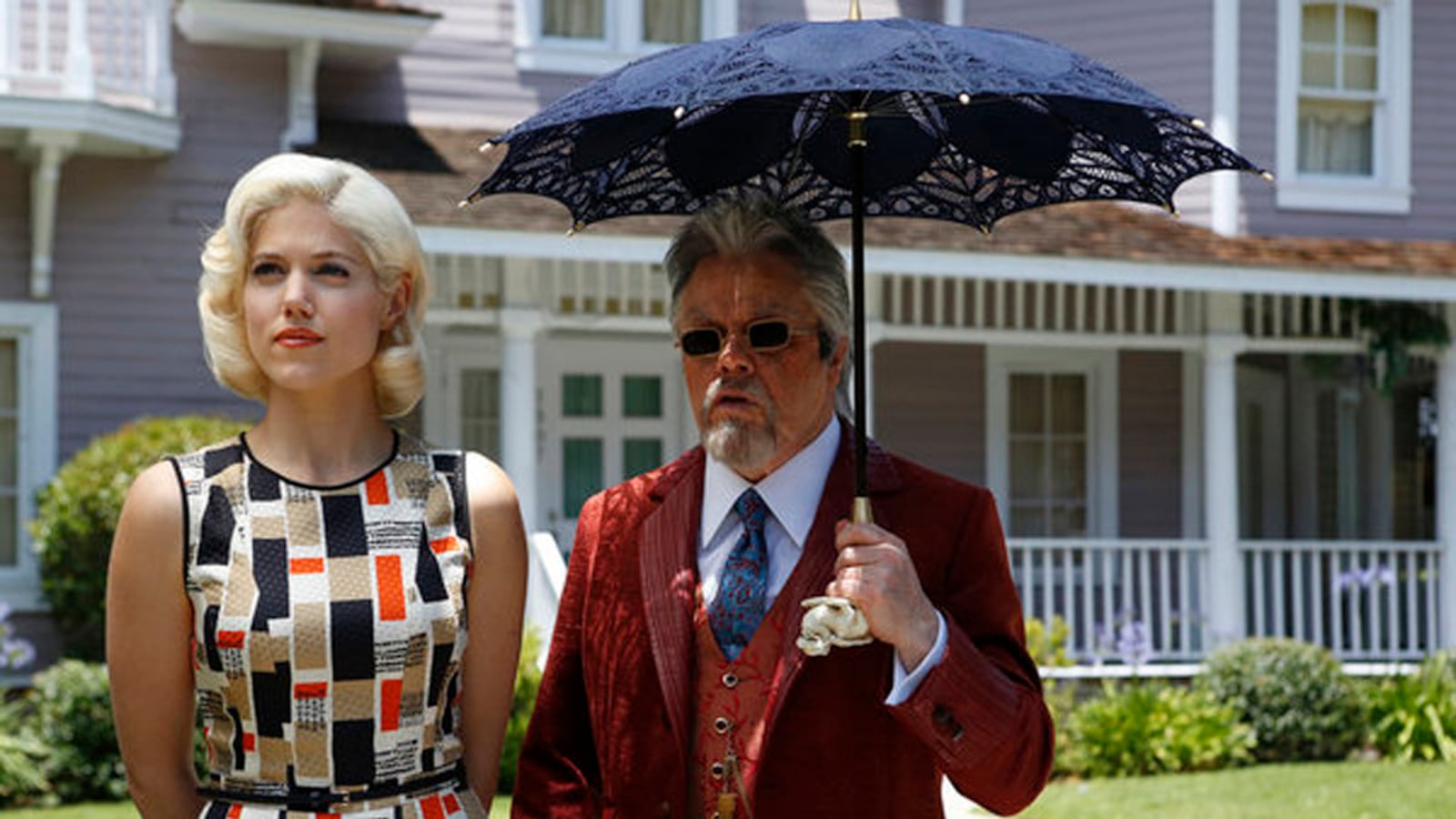The Munsters are back from the dead, though possibly for just one night.
The supernatural clan was the subject of the 1964–1966 sitcom (and its syndicated sequel, The Munsters Today, which ran from 1988–1991), notable for a few things: the show aired at the same time as that other spooky family sitcom, The Addams Family; the original series is still a cultural touchstone despite only lasting 70 episodes; and the show juxtaposed the supernatural—embodied by iconic characters from Universal’s library of horror titles—with the mundane, giving the audience ghouls attempting to assimilate into a world that feared and misunderstood them, even as they recapitulated the status quo of sitcom trappings.
Made up of father-and-daughter vampires, a blue-collar Frankenstein's monster, a prepubescent werewolf, and their seemingly normal pink-skinned family relation, the Munsters return in Mockingbird Lane, which will air its pilot episode tonight at 8 p.m. on NBC.
Like the characters themselves, things are complicated: NBC is said to have passed on Mockingbird Lane but could still be deliberating about the fate of the potential series, using tonight’s episode as an attempt to gauge audience interest. Which means that tonight’s broadcast could be either a one-off special or a sneak peek, depending on how the ratings stack up.
Mockingbird Lane owes more to both the visual style and banter of the short-lived ABC drama Pushing Daisies—also from creator Bryan Fuller—than its previous television incarnations. With Mockingbird Lane, Fuller infuses the struggles of the titular monsters with existential angst, setting their plights—whether it be self-acceptance, fitting in, finding love and happiness, or sating an incessant bloodlust—against a gorgeously hyper-real backdrop. The art direction on the pilot is alone worth the price of admission, a fusion of computer-generated images, painstakingly designed sets, and a sense of wonder and whimsy.
(My only major complaint is the makeup that Eddie Izzard suffers through for much of the episode. Whereas every other visual element—from a gorgeous if malevolent full moon in the sky to the detailing within the house—is meticulous, there’s an odd droopiness to the old-age makeup here, an incongruousness that stands out from the fineness of the overall vision.)
With its pilot, Mockingbird Lane plays with the audience’s preconceptions, turning expectations into inside jokes that recall the earlier series. The first shot of Herman Munster (Jerry O’Connell), the paterfamilias cobbled together from spare body parts, finds him in silhouette, before he steps aside to reveal that the familiar bolts on either side of his neck are actually the shadows cast by a lantern. The staircase flips upward to reveal a hidden lair, just as it did in the original; a fire-breathing dragon named Spot makes an appearance, as does the original Eddie Munster, Butch Patrick.
Viewers of the original are rewarded, but such vigilance isn’t necessary: Fuller and director Bryan Singer make the story both accessible and innately relatable. For all their monstrousness, the Munsters are painfully human, given to foibles and concerns that plague many of us, but which are rendered in a heightened fashion. Herman loves too much, too deeply, and his heart gives out (literally) in the first few minutes of the pilot, requiring both repair and self-analysis. Who is he? Is he the sum of his (body) parts?
O’Connell, an unconventional choice for Herman, dazzles here, delivering an unexpectedly rounded sweetness to Herman, his boyishness played to full effect, a magnificent counterpoint to the haughty savagery of Izzard’s Grandpa, who turns the family’s new neighbors into blood slaves and who casts off his clothes to rip into a lion. As Herman’s wife, the vampiric Lily, Portia de Rossi slinks along as if her feet never quite touch the ground, yet her maternal instincts for her son, Eddie (Mason Cook)—whose transformation into a werewolf cannily plays with puberty-related issues—never waver, even if her sister did try to eat her own offspring, the very human Marilyn (Charity Wakefield).

Moving into a new neighborhood, the Munsters begin a new life in an abandoned mansion slated for demolition, whose faux-Gothic exterior previously concealed the bodies of murdered hobos. Grisly? Yes, but the dark set-up also keeps with the mix of high and low culture and sweet and bitter tones that Fuller enjoys employing, layering the pilot episode with sight gags, existential riffs, and in-jokes. Everything becomes grist for the story mill; even a corgi seated on top of a grumpy wheelchair-bound neighbor (frequent Fuller collaborator Beth Grant) intrigues with the potential for his own backstory.
The result is sweet and intriguing, with enough charm to make me want to see just where the series would go, as the family explores the lush, visually rich world of Mockingbird Heights and attempts to discover whether they ultimately want to be human or monster, whether to embrace pride or shame in their cultural—or is it supernatural?—identity.






